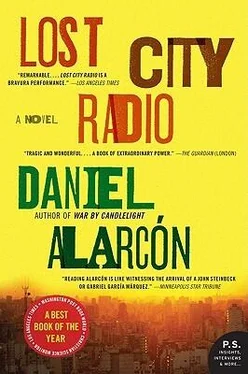Daniel Alarcon
Lost City Radio
Q.E.P.D.
Javier Antonio Alarcón Guzmán
1948–1989
It is the people who are executed and the people who make up the firing squad; the people are both vague randomness and precise law. There are no tricks, nor can there be.
— CARLOS MONSIVÁIS
THEY TOOK Norma off the air that Tuesday morning because a boy was dropped off at the station. He was quiet and thin and had a note. The receptionists let him through. A meeting was called.
The conference room was full of light and had an expansive view of the city, looking east toward the mountains. When Norma walked in, Elmer was seated at the head of the table, rubbing his face as if he’d been woken from a restless, unsatisfying sleep. He nodded as she sat, then yawned and fiddled with the top of a pill bottle he’d taken from his pocket. “Go for some water,” he groaned to his assistant. “And empty these ashtrays, Len. Jesus.”
The boy sat across from Elmer, in a stiff wooden chair, staring down at his feet. He was slender and fragile, and his eyes were too small for his face. His head had been shaved — to kill lice, Norma supposed. There were the faint beginnings of a mustache above his lips. His shirt was threadbare, and his unhemmed pants were knotted around his waist with a shoestring.
Norma sat closest to him, her back to the door, facing the white city.
Len reappeared with a pitcher of water. It was choked with bubbles, tinged gray. Elmer poured himself a glass and swallowed two pills. He coughed into his hand. “Let’s get right to it,” Elmer said when Len had sat. “We’re sorry to interrupt the news, Norma, but we wanted you to meet Victor.”
“Tell her how old you are, boy,” Len said.
“I’m eleven,” the child said, his voice barely audible. “And a half.”
Len cleared his throat, glanced at Elmer, as if for permission to speak. With a nod from his boss, he began. “That’s a terrific age,” Len said. “Now, you came looking for Norma, isn’t that right?”
“Yes,” Victor said.
“Do you know him?”
Norma didn’t.
“He says he came from the jungle,” Len continued. “We thought you’d want to meet him. For the show.”
“Great,” she said. “Thank you.”
Elmer stood and walked to the window. He was a silhouette against the hazy brightness. Norma knew that panorama: the city below, stretching to the horizon and still farther. With your forehead to the glass, you could see down to the street, to that broad avenue choked with traffic and people, with buses and moto-taxis and vegetable carts. Or life on the city’s rooftops: clothes hanging on a line next to rusting chicken coops, old men playing cards on a milk crate, dogs barking angrily, teeth bared at the heavy sea air. She’d even seen a man once, sitting on his yellow hard hat, sobbing.
If Elmer saw anything now, he didn’t seem interested. He turned back to them. “Not just from the jungle, Norma. From 1797.”
Norma sat up straight. “What are you telling me, Elmer?”
It was one of the rumors they knew to be true: mass graves, anonymous villagers, murdered and tossed into ditches. They’d never reported it, of course. No one had. They hadn’t spoken of this in years. She felt something heavy in her chest.
“It’s probably nothing,” Elmer said. “Let’s show her the note.”
From his pocket, Victor produced a piece of paper, presumably the same one he had shown the receptionist. He passed it to Elmer, who put on his reading glasses and cleared his throat. He read aloud:
Dear Miss Norma:
This child is named Victor. He is from Village 1797 in the eastern jungle. We, the residents of 1797, have pooled our monies together and sent him to the city. We want a better life for Victor. There is no future for him here. Please help us. Attached find our list of lost people. Perhaps one of these individuals will be able to care for the boy. We listen to Lost City Radio every week. We love your show.
Your biggest fans,
Village 1797
“Norma,” Elmer said, “I’m sorry. We wanted to tell you ourselves. He’d be great for the show, but we wanted to warn you first.”
“I’m fine.” She rubbed her eyes and took a deep breath. “I’m fine.”
Norma hated the numbers. Before, every town had a name; an unwieldy, millenarian name inherited from God-knows-which extinct people, names with hard consonants that sounded like stone grinding against stone. But everything was being modernized, even the recondite corners of the nation. This was all postconflict, a new government policy. They said people were forgetting the old systems. Norma wondered. “Do you know what they used to call your village?” she asked the boy.
Victor shook his head.
Norma closed her eyes for a second. He’d probably been taught to say that. When the war ended, the government confiscated the old maps. They were taken off the shelves at the National Library, turned in by private citizens, cut out of school textbooks, and burned. Norma had covered it for the radio, had mingled with the excited crowd that gathered at Newtown Plaza to watch. Once, Victor’s village had a name, but it was lost now. Her husband, Rey, had vanished near there, just before the Illegitimate Legion was defeated. This was at the end of the insurrection, ten years before. She was still waiting for him.
“Are you all right, Miss Norma?” the boy asked in a small, reedy voice.
She opened her eyes.
“What a polite young man,” Len said. He leaned forward, rested his elbows on the table, and patted the boy on his bald head.
Norma waited for a moment, counting to ten. She picked up the paper and read it again. The script was steady and deliberate. She pictured it: a town council gathering to decide whose penmanship was best. How folkloric. On the back was a list of names. “Our Missin g ,” it said, the end of the g curling upward in an optimistic flourish. She couldn’t bear to read them. Each was a cipher, soulless, faceless, sometime humans, a harvest of names to be read on the air. She passed the note back to Elmer. The idea of it made her inexplicably sleepy.
“Do you know these people?” Elmer asked the boy.
“No,” Victor said. “A few.”
“Who brought you to the station?”
“My teacher. His name is Manau.”
“Where is he?” asked Len.
“He left me.”
“Why did they send you?”
“I don’t know.”
“Your mother?” Norma asked.
“She’s dead.”
Norma apologized; Len took copious notes.
“Father?” said Elmer.
The boy shrugged. “I’d like some water, please.”
Elmer poured the boy a glass, and Victor drank greedily, trickles of water running down the sides of his mouth. When he finished, he wiped his lips on the sleeve of his shirt.
“There’s more,” Elmer said, smiling. “Have some more.”
But Victor shook his head and looked out the window. Norma followed his gaze. It was a colorless, late-winter day in the city, the soft outline of the mountains disappearing behind the fog. There was nothing to see.
“What do you want me to do?” Norma asked.
Elmer pursed his lips. He motioned for Len to take the boy. Victor rose and left the room without protest. Elmer didn’t speak again until he and Norma were alone. He scratched his head, then held up the pill bottle. “These are for stress, you know. My doctor says I spend too much time here.”
“You do.”
“You do too,” he said.
“What’s on your mind, Elmer?”
Читать дальше












